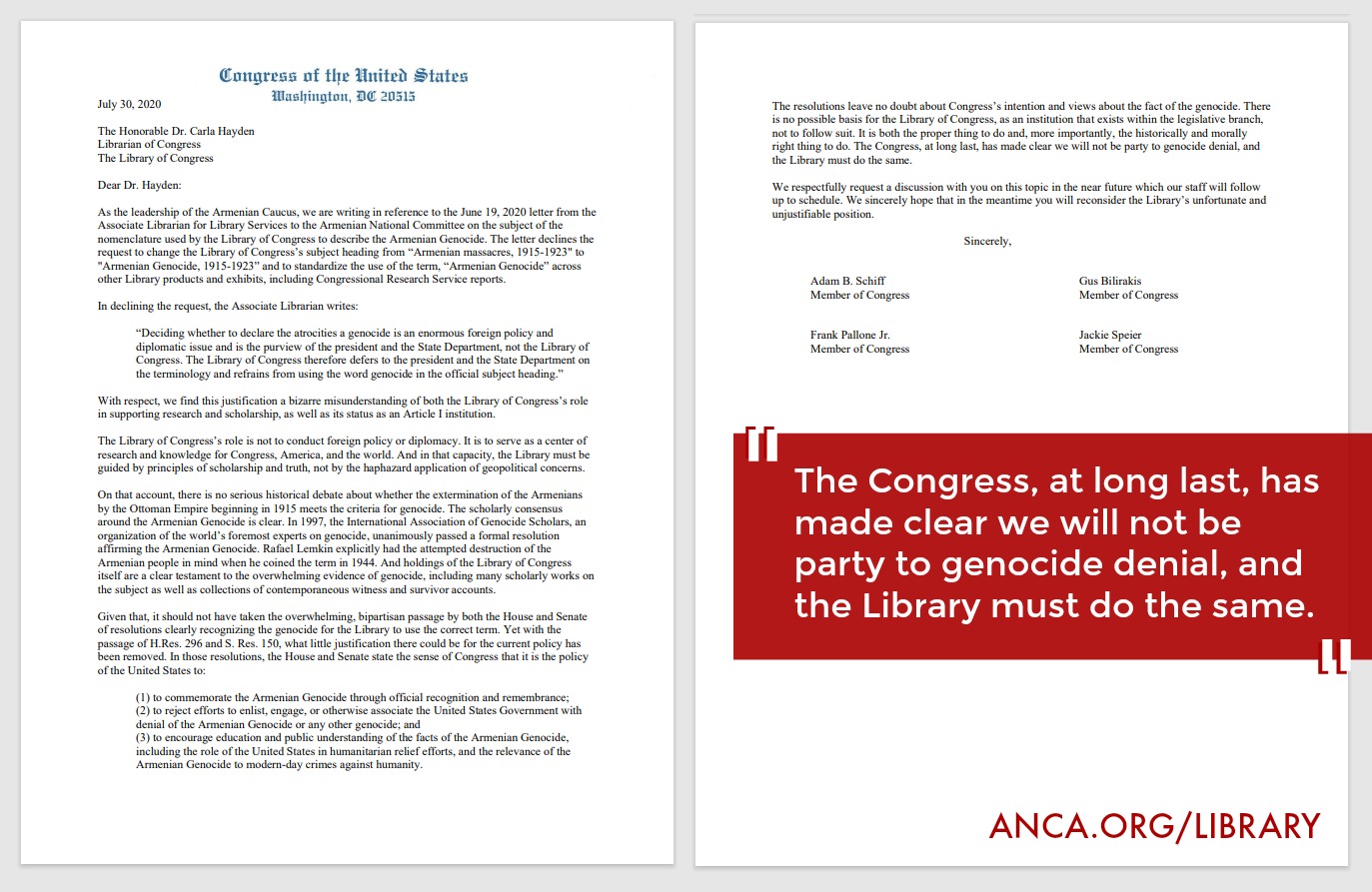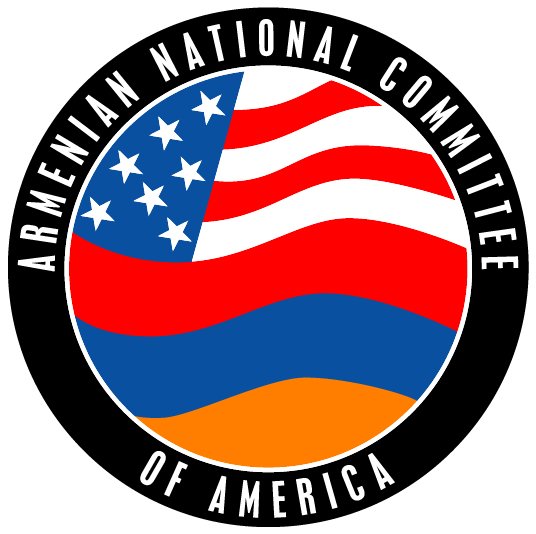
WASHINGTON, DC – The bipartisan leadership of the Congressional Armenian Caucus has called on the Librarian of Congress to explain the “bizarre” refusal of this agency of the US Legislative Branch to correct its “Armenian Massacres” subject heading to “Armenian Genocide,” even in the wake of last year’s Congressional resolutions unequivocally recognizing this crime and explicitly rejecting its denial, reported the Armenian National Committee of America (ANCA).
The Armenian Caucus letter comes in the wake of an exchange of correspondence between the Library of Congress and the ANCA, during which Associate Librarian for Library Services, Robin L. Dale, declined the ANCA’s request for this change. She explained that the “The Library of Congress … defers to the president and the State Department on the terminology and refrains from using the word genocide in the official subject heading.”
In a July 30, 2020 letter addressed to the Librarian of Congress, Dr. Carla Hayden, Congressional Armenian Caucus leaders Adam Schiff (D-CA), Gus Bilirakis (R-FL), Jackie Speier (D-CA), Frank Pallone (D-NJ), and replied: “With respect, we find this justification a bizarre misunderstanding of both the Library of Congress’s role in supporting research and scholarship, as well as its status as an Article I institution.” They added: “The Library of Congress’s role is not to conduct foreign policy or diplomacy. It is to serve as a center of research and knowledge for Congress, America, and the world. And in that capacity, the Library must be guided by principles of scholarship and truth, not by the haphazard application of geopolitical concerns.”
The four legislators closed their letter by asking Dr. Hayden to reconsider the Library’s unfortunate and unjustifiable position, and requesting a discussion with her on this subject.
“We want to thank Congressman Schiff and his Armenian Caucus colleagues – Gus Bilirakis, Jackie Speier, and Frank Pallone – for following up on the ANCA’s request that the Library of Congress correct its Armenian Genocide subject heading and standardize the use of this proper terminology across all of the Library’s products, exhibits, and reports,” said Aram Hamparian, Executive Director of the ANCA. “We share their principled view that this change should not have required passage of House and Senate resolutions, but – in the wake of the overwhelming adoption of these bipartisan measures – it’s clear to all that no justification remains for the Library’s current policy.”
The full text of the Armenian Caucus letter is provided below. The ANCA’s December 2019 letter to the Library of Congress is available here: http://anca.org/assets/pdf/
#####
Congressional Armenian Caucus Letter to the Library of Congress Dr. Carla Hayden
July 30, 2020
The Honorable Dr. Carla Hayden
Librarian of Congress
The Library of Congress
Dear Dr. Hayden:
As the leadership of the Armenian Caucus, we are writing in reference to the June 19, 2020 letter from the Associate Librarian for Library Services to the Armenian National Committee on the subject of the nomenclature used by the Library of Congress to describe the Armenian Genocide. The letter declines the request to change the Library of Congress’s subject heading from “Armenian massacres, 1915-1923″ to “Armenian Genocide, 1915-1923” and to standardize the use of the term, “Armenian Genocide” across other Library products and exhibits, including Congressional Research Service reports.
In declining the request, the Associate Librarian writes:
“Deciding whether to declare the atrocities a genocide is an enormous foreign policy and diplomatic issue and is the purview of the president and the State Department, not the Library of Congress. The Library of Congress therefore defers to the president and the State Department on the terminology and refrains from using the word genocide in the official subject heading.”
With respect, we find this justification a bizarre misunderstanding of both the Library of Congress’s role in supporting research and scholarship, as well as its status as an Article I institution.
The Library of Congress’s role is not to conduct foreign policy or diplomacy. It is to serve as a center of research and knowledge for Congress, America, and the world. And in that capacity, the Library must be guided by principles of scholarship and truth, not by the haphazard application of geopolitical concerns.
On that account, there is no serious historical debate about whether the extermination of the Armenians by the Ottoman Empire beginning in 1915 meets the criteria for genocide. The scholarly consensus around the Armenian Genocide is clear. In 1997, the International Association of Genocide Scholars, an organization of the world’s foremost experts on genocide, unanimously passed a formal resolution affirming the Armenian Genocide. Rafael Lemkin explicitly had the attempted destruction of the Armenian people in mind when he coined the term in 1944. And holdings of the Library of Congress itself are a clear testament to the overwhelming evidence of genocide, including many scholarly works on the subject as well as collections of contemporaneous witness and survivor accounts.
Given that, it should not have taken the overwhelming, bipartisan passage by both the House and Senate of resolutions clearly recognizing the genocide for the Library to use the correct term. Yet with the passage of H.Res. 296 and S. Res. 150, what little justification there could be for the current policy has been removed. In those resolutions, the House and Senate state the sense of Congress that it is the policy of the United States to:
(1) to commemorate the Armenian Genocide through official recognition and remembrance;
(2) to reject efforts to enlist, engage, or otherwise associate the United States Government with denial of the Armenian Genocide or any other genocide; and
(3) to encourage education and public understanding of the facts of the Armenian Genocide, including the role of the United States in humanitarian relief efforts, and the relevance of the Armenian Genocide to modern-day crimes against humanity.
The resolutions leave no doubt about Congress’s intention and views about the fact of the genocide. There is no possible basis for the Library of Congress, as an institution that exists within the legislative branch, not to follow suit. It is both the proper thing to do and, more importantly, the historically and morally right thing to do. The Congress, at long last, has made clear we will not be party to genocide denial, and the Library must do the same.
We respectfully request a discussion with you on this topic in the near future which our staff will follow up to schedule. We sincerely hope that in the meantime you will reconsider the Library’s unfortunate and unjustifiable position.
Sincerely,
Adam B. Schiff
Member of Congress
Gus Bilirakis
Member of Congress
Jackie Speier
Member of Congress
Frank Pallone Jr.
Member of Congress



Be the first to comment